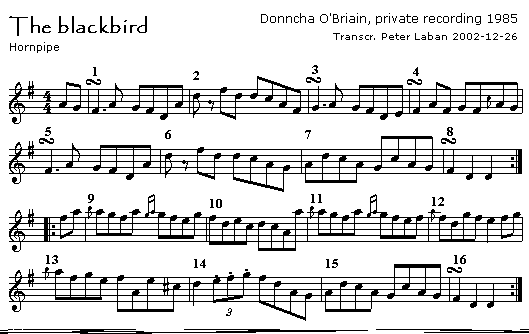A brief analysis by Peter Laban, 26 December 2002

A brief analysis by Peter Laban, 26 December 2002
The tune is displayed in the left frame, comments in the lower right frame, so that you can scroll through the text while viewing the music.
The second tune in a set of two hornpipes recorded in 1985. The blackbird or An londubh is a hornpipe Donncha often played with The golden eagle. Breathnach in the first volume of Ceol Rinnce na hEireann gives a verse of a song sometimes sung to the tune:
The Maytime is come and the gay flowers are springing
The wild birds are singing their loving notes o'er.
But all the day long through my lone heart is ringing
The voice of my blackbird, I'll never see more.
Please note all low Ds in the playing were raised an octave, even where I wrote them in the lower octave.
The playing here is as always in Donncha's playing of great clarity and the approach to the tune is one of great taste and subtlety.
Free-flowing rolls like those in bars 1, 3 and 5 are contrasted with short tongued notes and stops like the one in bar 2. There is a certain amount of doubling notes that is very effective like the opening bar of the second part of the tune instead of being approached with fg afga goes fa afga.Another highly effective feature that occurs throughout Donncha's playing is the dropping down to A in part of the melody. In this tune this occurs in bar 13 where fdec become fAec, a very effective device which permeates the tune. It is a feature also found in the playing of Micho Russell and Mary Bergin.
Throughout the tune there are subtle shifts in the rhythm and accents fall in slightly different places. A feature present in the playing of all good players, this makes good traditional playing such joy to listen to. An obvious example can be found in bar 14 where the d is followed in the first playing transcribed here by a fine unexpected staccato triplet.
This transcription only represents the first playing of each part: it is not meant to become a setting set in stone. Throughout the playing there is an abundance of small variations that are part and parcel of good traditiopnal playing. Use the written notes as a starting point only.
Peter Laban, Miltown Malbay, Co Clare, 26 Decmber 2002